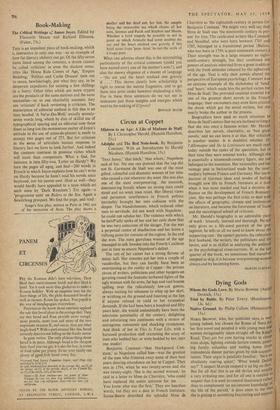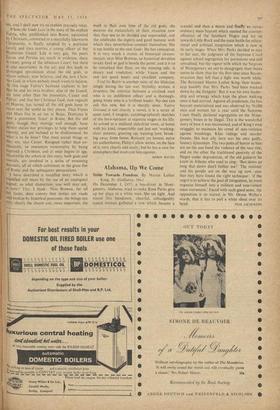Dying Gods
MARIA BROWNE, Who, her publisher says, is verY young indeed, has chosen the Rome of Nero for her first novel and peopled it with young men and women recognisably taken straight off the King's Road. They,are for ever having snacks in cheap wine shops, fighting outside lecture rooms, pawn- ing family valuables and reeling home from immoderate dinner parties given by rich acquain' tanees. Their argot is painfully familiar : 'He's an absolutely roaring queer,' What would DaddY, say?' suspect Marcus mopped it up big on dice.' But for all that this is an old device and usuallY a very irritating one, and for all one is entitled to suspect that it is used to conceal inaccuracy rather than to complement 'an uncommon knowledge of
the life of the period,' it does seem to me that she is getting at something fascinating and imeort" ant, and I shall now try to explain precisely what.
Whom the Gods Love is the story of the orphan Fulvia, who. pitchforked into Rome, succoured by Christians, converted to a mercifully lukewarm Christianity, is finally adopted by a patrician family and then marries a young officer of the Praetorian Guard. Life is very gay, the poets Lean and ,Persius are much in evidence, there is meaty gossip of the infamous Court; but there Is also uncertainty in the air, and this leads to Prolonged speculation about the old gods, in whom nobody now believes, and the new Chris- tian God, in whom nobody much wants to believe. At this stage Fulvia's husband explains to her that he and his twin brother, also of the Guard, are none other than the immortals, Castor and Pollux; and that her Christian God, now regnant In Heaven, has turned all the old gods loose to roam over the world as they please. Thus Venus and Mars live in an inn at Baiae, Dionysus is now a prominent 'fence' in Rome. But the old gods, though they manage well enough, have neither duties nor privileges to help them spend eternity, and are inclined to he disillusioned. So what is to be done? One must accept things as they are, says Castor. Resigned rather than en- thusiastic, he renounces immortality by being baptised a Christian, and at once begins to age. Meanwhile the others in this story, both gods and mortals, are involved in a series of mounting disasters, all of which culminate in the great fire of Rome and the subsequent persecutions.
I have described a muddled story which is muddled still more by the use of an unoriginal legend; so what distinction. you well may ask, IN here? This, I think : Miss Browne, for all her faults, does convey that deities are made and broken by historical processes: she brings out - very clearly the charm and, more important. the truth in their own time of the old gods; she mourns the melancholy of their situation now that they are to be derided and .superseded, and she celebrates the dignity and good humour with which they nevertheless conduct themselves. She is not hostile to the new God : He has conquered. It is very much a matter of historical circum- stances, says Miss Browne. so hysterical devotion to any God or god is beside the-point; and it is to be remarked that Paul, on the winning side, is dreary and vindictive, while Venus and the rest are good losers and excellent company.
Trial by Battle is another story of the Malayan jungle during the last war. Stylishly written, it proposes the contrast between a civilised man who is an indifferent officer and a thorough- going brute who is a brilliant leader. No one can call this new, but it is sharply done. Native Ground, is not exactly a novel, it is a series of quiet (and. I imagine, autobiographical) sketches of the hero-narrator at separate stages in his life. At school in a midland industrial town, at home with his kind, respectable and just not 'working- class' parents: growing up. wanting, love; break- ing away from home. Reticent yet honest, naïve yet authoritative, Philip Callow writes, on the face of it,-very clearly and easily; but he has a care for atmosphere that must cost him agonies.
SIMON RAVEN



































 Previous page
Previous page